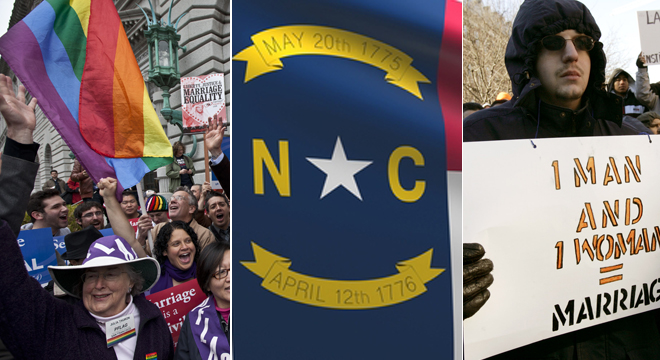When North Carolina holds an election on May 8, voters won’t merely be deciding the fate of same-sex marriage in the state; they will be voting on an amendment with implications that could affect gay and straight couples alike.
If passed, Amendment One would establish marriage between a man and a woman as the only legally recognized union in the state — a sweeping distinction that would preclude legal recognition for all other domestic partnerships. The broad language of the amendment, which was passed by the Republican-controlled general assembly last fall, has opponents fearful that its passage could ultimately deny both benefits and domestic violence protections to thousands of unmarried North Carolina couples.
Supporters of Amendment One reject those notions and argue that it will simply codify existing law (the state already has a law banning same-sex marriage). They cite a 2004 Ohio law, which also denied legal recognition for civil unions, as an important precedent. The Supreme Court of Ohio eventually ruled that domestic violence statutes were compatible with the amendment, as such protections do not rise to the level of marriage. But Dr. Maxine Eichner, a professor at the University of North Carolina School of Law, says the fundamental difference between the respective amendments is in the language.
“[The Ohio amendment] prohibits anything that ‘approximates’ marriage,” Eichner told TPM. “Our amendment is much broader. It says you can’t recognize or validate these relationships at all.”
In the absence of any legal recognition, unmarried couples — whether gay or straight — could conceivably see courts invalidate their domestic violence protections. Eichner says it would depend on how judges read the amendment, but a broad interpretation is certainly possible.
“What we have here is untested language that would need to be interpreted by the courts,” Eichner said. “On its face, it would be interpreted with far-reaching effects.”
Chris Fitzsimon, director of the progressive NC Policy Watch, agrees and envisions a clogging of the state’s court system in the years following the amendment’s passage. “At the very least, it will mean that our courts will be tied up for years trying to figure out what this law means for domestic violence cases,” Fitzsimon told TPM. “People really need to know that it is not just about same-sex marriage.”
Eichner first caught wind of Amendment One about a year ago, when someone called her attention to a string of constitutional changes that were being considered by Republican members of the general assembly. That prompted Eichner and some of her colleagues to pen a paper on the potential consequences of Amendment One, which they disseminated to state legislators.
“They still ran with the amendment,” Eichner said. It wouldn’t be the first time she and her fellow law professors were rebuffed by the pro-amendment forces within the general assembly. Last fall, before the amendment had emerged from the House Rules Committee, Eichner and her colleagues sought to testify before the legislative panel. They were told there would be no public comment.
“Their response was that the public will have the right to comment on this by giving it an up or down vote on May 8,” Eichner said.
The foremost champion of Amendment One in the general assembly is Rep. Paul Stam (R), the Majority Leader of the state house who has made headlines in the past for his strong opposition to gay marriage. In August, he likened gay marriage to both incest and polygamy. Stam was unavailable for an interview, but he did provide TPM with a report on the amendment that he authored. In it, he acknowledges that the amendment would prohibit the state government from providing benefits to a person based on any union other than marriage.
“But [g]overnment could still extend employment benefits that impact or benefit non-married domestic households,” he wrote. “The extension of such benefits, however, could not be predicated only upon the status of a domestic relationship other than marriage.”
According to Fitzsimon, Stam’s influence in Raleigh looms large. “He’s the most powerful member of the general assembly,” Fitzsimon said. “He’s the hardest of the hard right and he has quite a following here. He has considerable sway over what happens in the House.”
Despite Stam’s clout, State Sen. Ellie Kinnaird (D) told TPM that she knows many Republican members who had reservations about Amendment One. State House Speaker Thom Tillis (R), a supporter of the amendment, even told a student group at North Carolina State University last month that he predicts the measure will pass but will be repealed within 20 years.
“There were plenty of Tea Partiers and moderates who were not enthusiastic about this,” Kinnaird, who has served in the state senate since 1997, said. “They really did not want to vote for this.”
Polls have shown that plenty of North Carolina voters support the measure, although caveats abound. A survey by Public Policy Polling (D) last month showed that 58 percent of likely voters intend to vote for the amendment, but many are ill-informed of its actual consequences. For example, 51 percent said they support some legal recognition for gay or lesbian couples, be it marriage or a civil union — yet 34 percent of that same group still intend to vote for the amendment.
Dustin Ingalls, assistant to the director at PPP, said that while the knowledge deficit will pose a challenge for the anti-amendment contingent, it indicates that their coalition will only grow over the next month. “Support for the amendment probably won’t get any higher than it is right now,” Ingalls told TPM. “It will probably close and not get wider.”
At first blush, the springtime election date would figure to overwhelmingly benefit the pro-amendment campaign. The Republican presidential primary in the state will also be held on May 8, but interest in that contest will continue to wane since Mitt Romney has all but wrapped up the GOP nomination and Ingalls said he expects turnout between the two parties to be evenly divided. Moreover, North Carolina Democrats are actually split on the issue, due in large part to robust support for the amendment from African-American voters.
The effort to close the gap in the polls is being led by a cadre of LGBT advocacy groups, including the Human Rights Campaign (HRC). HRC has contributed roughly $250,000 of staff-time and other in-kind donations, making it the largest contributor to the anti-amendment campaign. Karin Quimby, southern regional field director for HRC, said the group has tried to educate the public of Amendment One’s potentially widespread impact through grassroots efforts.
“Our overarching message is that it goes too far,” Quimby told TPM. “We’re majorly involved in the field part of the campaign and we’ve seen a real groundswell of folks actively working against this amendment.”
The National Organization of Marriage and Vote for Marriage NC, two coalitions behind the pro-amendment campaign, did not respond to TPM’s request for comment.
Quimby said that HRC has used the Ohio law as a cautionary tale to North Carolina voters. One similarity the two states might share is in the legal ambiguity that will almost certainly follow passage of the North Carolina amendment. Between 2005 and 2007, Ohio’s courts heard cases wherein some defense attorneys successfully argued that domestic violence protections could not apply to unmarried couples. In 2007, the state’s Supreme Court ruled that those protections cover unmarried couples, but Eichner notes that the law had already done damage.
“Yes, the Supreme Court stepped in and said the domestic violence protections are constitutional, but that happened after three years,” Eichner said. “There is not a shred of empirical evidence out there that these amendments do anything positive for families.”










